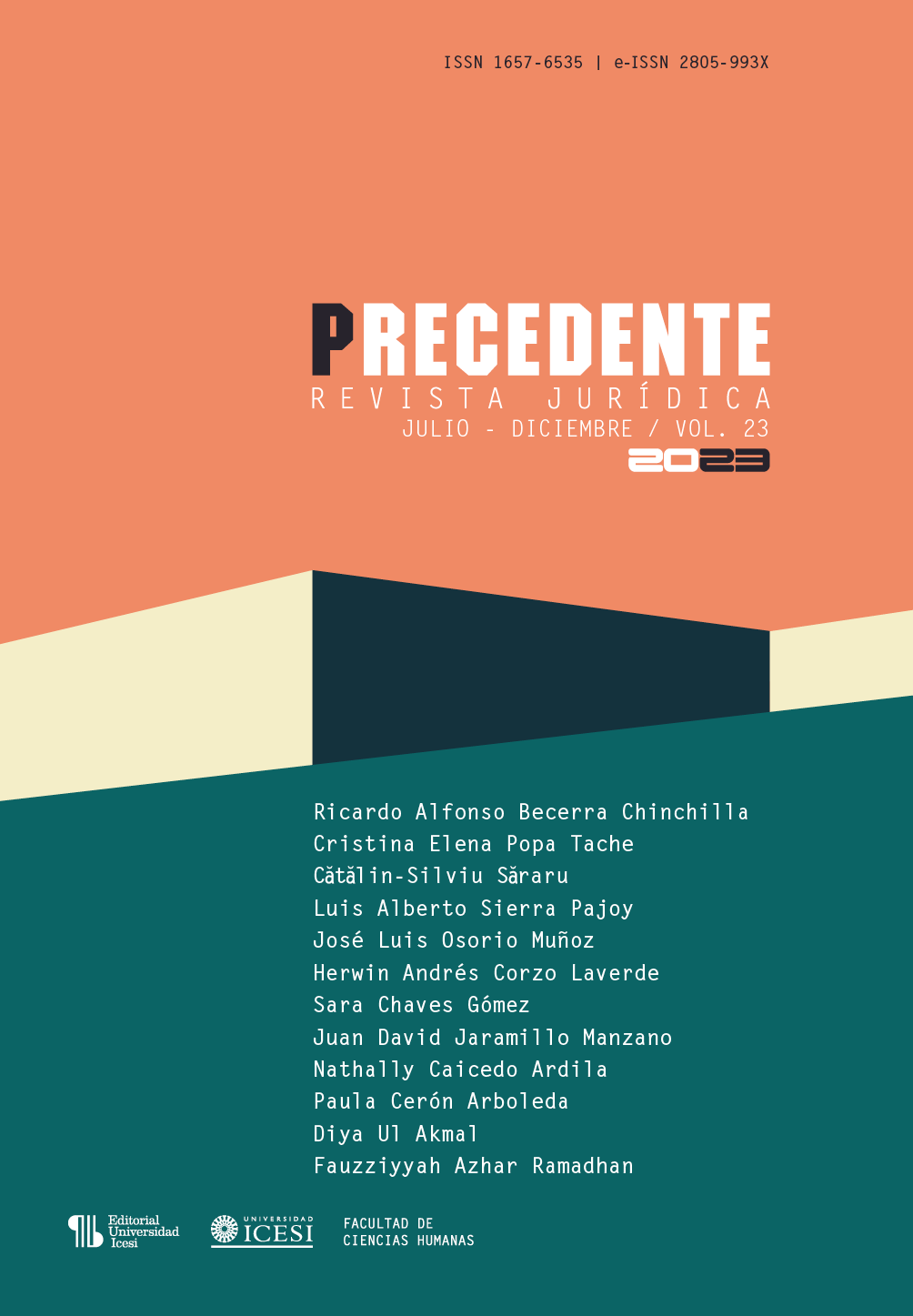Neoconstitutional Interpretation of the Right to Free Development of Personality: A Reflection on Public Policy Regarding Cigarette Consumption in Penitentiary and Prison Establishments in Colombia
DOI:
https://doi.org/10.18046/prec.v23.6263Keywords:
Free Development of Personality, Social and Democratic State of Law, Public Policy, Consumption, Penitentiary EstablishmentsAbstract
This article establishes that the Colombian Constitutional Court bases a substantial interpretation and definition of the right to the free development of personality on a public policy of liberal lineage, sponsored by the paradigm of the new constitutionalism. The contextual framework in which this hypothesis is developed is the Republic of Colombia, where judgment T-479 of 2015 was issued. It is concluded that there are minimal moral commitments between the State and its citizens, beyond the simple maintenance of public order preached by liberal neutrality. For example, the impact of public policy on cigarette consumption in prisons configures commitments that should be met by the State. To achieve the objective of this work, a type of descriptive legal study is used, allowing for the delimitation of the object of analysis. Through deduction as a method, a tool is utilized that enables concrete conclusions to be reached regarding the particular case of the sentence T-479 of 2015. The work aims to address the research problem of whether the neoconstitutionalist paradigm is a tool that allows the interpretation and substantial definition of the right to the free development of personality within the framework of the public policy of cigarette consumption in penitentiary establishments.
Downloads
References
Aldunate Lizana, E. (2010). Aproximación conceptual y crítica al neoconstitucionalismo. Revista de Derecho, 13(1), 79-102.
Alexy, R. (2003). Teoría de los derechos fundamentales (E. Garzón Valdés, Trad.). Centro de Estudios Políticos y Constitucionales.
Alexy, R. (2010). Derechos fundamentales, ponderación y racionalidad. En M. Carbonell y L. García Jaramillo (Coords.), El canon neoconstitucional (pp. 106-116). Trotta.
Bobbio, N. (1993). Liberalismo y Democracia. FCE.
Casquette, J. (2001). Liberalismo, cultura y neutralidad estatal: El Estado y la buena vida. Signos filosóficos, (6), 59-83.
Comanducci, P. (2002). Formas de (neo)constitucionalismo: un análisis metateórico. Isonomía, (16), 100.
Congreso de la República de Colombia. (2009, 21 de julio). Ley 1335. Por la cual se establecen disposiciones que previenen daños a la salud de los menores de edad, la población no fumadora y se estipulan políticas públicas para la prevención del consumo del tabaco y el abandono de la dependencia del tabaco del fumador y sus derivados en la población colombiana. Diario Oficial 52.418. https://www.funcionpublica.gov.co/eva/gestornormativo/norma.php?i=36878
Constitución Política de Colombia. (1991). http://www.secretariasenado.gov.co/constitucion-politica
Corte Constitucional de Colombia, Sala Plena. (1 de marzo de 2011). Sentencia C-122 [M. P. Henao, J.]. https://www.corteconstitucional.gov.co/relatoria/2011/c-122-11.htm
Corte Constitucional de Colombia, Sala Octava de Revisión. (4 de agosto de 2015). Sentencia T-479 [M. P. Rojas, A.]. https://www.corteconstitucional.gov.co/Relatoria/2015/T-479-15.htm
Da Silveira, P. (1998). Neutralidad del Estado y respeto del pluralismo. Una defensa del perfeccionismo modesto. La Política, (4), 117-136.
Dworkin, R. (1999). Los derechos en serio. Ariel.
García Damborenea, R. (2012). Uso de razón. El arte de razonar, persuadir, refutar. Ediciones Uso de Razón.
García Jaramillo, L. (2015). Constitucionalismo deliberativo. Estudio sobre el ideal deliberativo de la democracia y la dogmática constitucional del procedimiento. UNAM.
Guastini, R. (1999). Principios de derecho y discrecionalidad judicial. Jueces para la democracia, (34), 39-46. https://www.researchgate.net/publication/28177179
Guastini, R. (2015). La interpretación de la Constitución. En J. Fabra y A. Núñez (Coords.), Enciclopedia de Filosofía y Teoria del Derecho (pp. 2011-2086). UNAM.
Guastini, R. (2016). A propósito del neoconstitucionalismo. Gaceta Constitucional, (67), 231-240. https://www.academia.edu/10261577/A_prop%C3%B3sito_del_neoconstitucionalismo_Riccardo_Guastini_
Hurka, T. (1993). Perfectionism. Oxford University Press.
Mill, J. S. (1977). Sobre la libertad. Ediciones Aguilar.
Ministerio de la Protección Social. (2006). Resolución 1956. Por la cual se adoptan medidas en relación con el consumo de cigarrillo o de tabaco. https://www.icbf.gov.co/cargues/avance/docs/resolucion_minproteccion_1956_2008.htm
Nino, C. S. (1989). Ética y derechos humanos. Ariel.
Orozco Torres, L. E. (2011). Seguridad Jurídica y Neoconstitucionalismo. Heurística Jurídica, (2), 65-73.
Solano, V. (2016). El neoconstitucionalismo. Una definición y una taxonomía latinoamericana. Ius Humani, 5, 161-172.
Tamayo Jaramillo, J. (2006). El Nuevo Derecho, el escepticismo ante las normas y el uso alternativo del derecho. Revista Facultad De Derecho y Ciencias Políticas, 36(105), 361-397.
Vigo, R. L. (1998). Aproximaciones a la seguridad jurídica. Revista Derechos y Libertades, 3(6), 495-516.
Vilajosana, J. M. (2008). Moralización del derecho, perfeccionismo y sociedad liberal: el principio de autonomía de la persona. Revista telemática de Filosofía del Derecho, (11), 145-179.
Downloads
Published
Issue
Section
License
Copyright (c) 2023 Luis Alberto Sierra Pajoy, José Luis Osorio Muñoz

This work is licensed under a Creative Commons Attribution-NonCommercial 4.0 International License.
Material in this publication may be reproduced without authorization, provided the title, author and institutional source is acknowledged.








